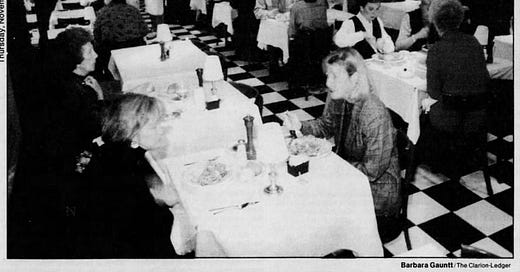I remember when Bill Latham and Al Roberts introduced the idea of fresh bread and olive oil at the table at Amerigo. People in Jackson had never heard of such. Amerigo had been a pizza joint that suffered a bad divorce, but grew into THE SPOT in Jackson for quite a while when Latham and Roberts took over.
The waiter came to our table and made this rehearsed presentation of pouring oil into a dish and grinding fresh pepper into it. I just looked at him like, "Son, are you on the drugs?"
My date had the bright idea of looking at other tables to see what they were doing, whereupon she said, "you do it like this!" suggesting that I had been the dummy all along. Things didn't work out between us, but she married and divorced a friend of mine twice. Redheads are something to behold, but proceed at your own risk, friend.
Every so often, I'd see Brum Day eating by himself at the bar. Brum was the kind of man where he'd never have to eat a meal alone. He'd never have to pay for his own meals if he didn't want to, but I think sometimes he just liked the independence of it. It amused me to see one of the most powerful men in Mississippi, just a-sittin' at the bar, waitin' on his noodles for supper, but that's what life was like in those days.
Bill Latham ran front-of-house like nobody you ever saw. He was actually a legend. Bill could remember every small detail about his customers except their names. I can't tell you how many times he'd lean over to me at the bar and say, "what's his name?" which was funny to me because he called me "Jim" half the time.
He probably got that from Billy Neville, who also called me "Jim" quite a bit. Bill and Billy got their start together in the building that used to house both Scrooges and The Rogue. Billy and some other guys thought they could run an English Pub profitably. They couldn't. Bill could, though. Between the two of them, you could learn everything you ever wanted to know about customer service. They were legendary creatures.
Brum Day knew, as I knew, that, for women of a certain strata and composition, there was no better place to assess the local talent than Amerigo in the eighties. The difference was that Brum was actually in love the entire time, he was just in denial. So was she. It took twenty years and the specter of a painful death, but they eventually had a meeting of the minds and of the heart. It meant a great deal to me when I learned that, in his final moments, Brum would find the love and acceptance he ran from his entire life.
I loved the man--more than you realize. The pain that came toward the end of his life was undeserved and cruel. He left behind something called "The Lucky Day" foundation, which always made me a little sad because I thought he deserved to be more lucky.
I never found the love that Brum did. I claimed to be looking for it at times, but I always found a way to escape before I got very close. I got married because I felt like I should. I loved her father, and he said I should too. Those are not the right reasons.
I eat lunch at Amerigo now, realizing that nearly everyone in these stories are gone. David Joseph and Al are still around, but whenever I ask a waitperson about them they look at me like I'm on tha' drugs.
Amerigo is part of the Mississippi Camelot story. It plays a role similar to The Prancing Pony in Lord of the Rings. I tell these stories sometimes wishing there were more happy endings, but they always end, and it's never happy. What's happy is the memory of the thing while it happened.




